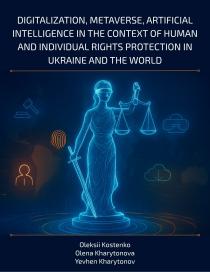ARTIFICIAL INTELLIGENCE AND PROTECTION OF INDIVIDUAL RIGHTS IN THE FIELD OF PHARMACY
Synopsis
The article is devoted to the study of trends and prospects for the use of artificial intelligence in the organization of pharmaceutical business. The relevance and significance of the research topic is substantiated. The key advantages of integrating artificial intelligence and other end-to-end technologies into the practice of pharmaceutical organizations in the context of drug discovery and development processes are considered. The author analyzes the trends in the use of artificial intelligence to improve (simplify and reduce the cost of) production, analytical, research and other business processes of a pharmaceutical organization, and provides practical examples. The article provides a brief overview of analysts' and experts' forecasts regarding the application of artificial intelligence in the pharmaceutical business organization in the short term. It is established that in order to realize these forecasts and, in general, to accelerate the industrialization of the pharmaceutical industry with the help of end-to-end technologies, as well as to stimulate the use of artificial intelligence to improve the organization of pharmaceutical business, a number of measures should be taken; to increase the availability of medicines in the pharmaceutical market, to ensure a higher level of compliance with regulatory requirements, as well as to increase the medical effectiveness and social significance of innovative developments in the field of circulation of medicines in the context of the
The author analyzes possible threats to the right to privacy arising from the use of artificial intelligence and suggests ways to eliminate them by improving the legislative mechanisms for personal data protection.
Protection of the right to privacy is becoming particularly important due to the rapid development of technology. Massive collection of personal data via the Internet and mobile applications, data analysis using AI, the use of biometric technologies, as well as the increase in cybercrime and illegal surveillance pose serious threats to an individual's privacy. Therefore, there is an urgent need for further research to ensure the right to privacy in the context of artificial intelligence. This right is enshrined in both universal and regional international agreements, such as the Universal Declaration of Human Rights, the International Covenant on Civil and Political Rights, the Convention for the Protection of Human Rights and Fundamental Freedoms, the Charter of Fundamental Rights of the European Union, and others. Society is increasingly aware of the importance of protecting confidentiality (privacy) and the potential risks in case of its violation. The use of personal data for government or commercial purposes raises ethical questions about the boundaries of what is permissible and inviolable. Increasing globalization requires coordinated approaches to privacy protection at the international level. The adoption of regulations such as the GDPR and the Artificial Intelligence Act in Europe, as well as the CCPA and CPRA in California, confirms the importance of personal data protection and the right to privacy.










